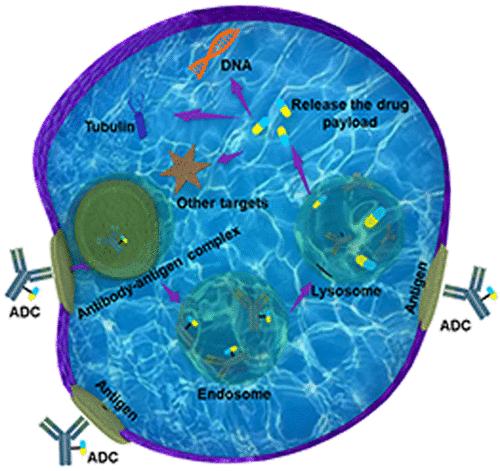当前位置:
X-MOL 学术
›
J. Med. Chem.
›
论文详情
Our official English website, www.x-mol.net, welcomes your
feedback! (Note: you will need to create a separate account there.)
Recent Advances in Targeted Cancer Therapy: Are PDCs the Next Generation of ADCs?
Journal of Medicinal Chemistry ( IF 6.8 ) Pub Date : 2024-07-09 , DOI: 10.1021/acs.jmedchem.4c00106 Baochen Zhang 1 , Mo Wang 1 , Li Sun 2 , Jiawei Liu 1 , Libinghan Yin 1 , Mingjing Xia 1 , Ling Zhang 2 , Xifu Liu 1 , Yu Cheng 1
Journal of Medicinal Chemistry ( IF 6.8 ) Pub Date : 2024-07-09 , DOI: 10.1021/acs.jmedchem.4c00106 Baochen Zhang 1 , Mo Wang 1 , Li Sun 2 , Jiawei Liu 1 , Libinghan Yin 1 , Mingjing Xia 1 , Ling Zhang 2 , Xifu Liu 1 , Yu Cheng 1
Affiliation

|
Antibody–drug conjugates (ADCs) comprise antibodies, cytotoxic payloads, and linkers, which can integrate the advantages of antibodies and small molecule drugs to achieve targeted cancer treatment. However, ADCs also have some shortcomings, such as non-negligible drug resistance, a low therapeutic index, and payload-related toxicity. Many studies have focused on changing the composition of ADCs, and some have even further extended the concept and types of targeted conjugated drugs by replacing the targeted antibodies in ADCs with peptides, revolutionarily introducing peptide–drug conjugates (PDCs). This Perspective summarizes the current research status of ADCs and PDCs and highlights the structural innovations of ADC components. In particular, PDCs are regarded as the next generation of potential targeted drugs after ADCs, and the current challenges of PDCs are analyzed. Our aim is to offer fresh insights for the efficient design and expedited development of innovative targeted conjugated drugs.
中文翻译:

癌症靶向治疗的最新进展:PDC 是下一代 ADC 吗?
抗体药物偶联物(ADC)由抗体、细胞毒性有效负载和连接体组成,可以整合抗体和小分子药物的优点,实现癌症的靶向治疗。然而,ADC也存在一些缺点,例如不可忽视的耐药性、治疗指数低以及与有效负载相关的毒性。许多研究都集中在改变ADC的组成上,有的甚至进一步扩展了靶向偶联药物的概念和类型,用肽代替ADC中的靶向抗体,革命性地引入了肽-药物偶联物(PDC)。本篇综述总结了ADC和PDC的研究现状,重点介绍了ADC器件的结构创新。特别是,PDC被视为继ADC之后的下一代潜在靶向药物,并分析了PDC目前面临的挑战。我们的目标是为创新靶向结合药物的有效设计和加速开发提供新的见解。
更新日期:2024-07-09
中文翻译:

癌症靶向治疗的最新进展:PDC 是下一代 ADC 吗?
抗体药物偶联物(ADC)由抗体、细胞毒性有效负载和连接体组成,可以整合抗体和小分子药物的优点,实现癌症的靶向治疗。然而,ADC也存在一些缺点,例如不可忽视的耐药性、治疗指数低以及与有效负载相关的毒性。许多研究都集中在改变ADC的组成上,有的甚至进一步扩展了靶向偶联药物的概念和类型,用肽代替ADC中的靶向抗体,革命性地引入了肽-药物偶联物(PDC)。本篇综述总结了ADC和PDC的研究现状,重点介绍了ADC器件的结构创新。特别是,PDC被视为继ADC之后的下一代潜在靶向药物,并分析了PDC目前面临的挑战。我们的目标是为创新靶向结合药物的有效设计和加速开发提供新的见解。











































 京公网安备 11010802027423号
京公网安备 11010802027423号